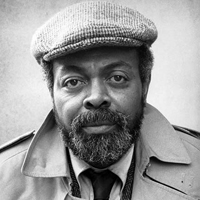Amiri Baraka - Biography and Works
Amiri Baraka also known as LeRoi Jones and Imamu Amear Baraka was born in Newark, New Jersey on October 7th 1934. He earned a B.A. from Howard University and an M.A from Columbia University. From 1954 until 1956 he lived in the United States Air Force.

Amiri Baraka (1934-2014)
Since then he had taught at, among other schools, the New School for Social Research and Columbia University and has devoted himself to various experimental artistic ventures and radical political causes. He was instrumental in the founding of several small magazines, the Black Arts Repertory Theatre in Harlem, and Spirit House in Newark. In the 1970s, when he became a Black Muslim and took the name Imanu Amiri Baraka (although later he dropped Imanu), he began to write polemic poetry espousing black militancy. He later joined the Communist Party.
In addition to poetry, he has written a novel, a collection of short stories, an autobiography, several plays, and numerous tracts on social issues. Baraka cites Allen Ginsberg as a major influence on his work, the primary themes of which include the nature of identity and the despair inherent in the human condition. He satirizes bourgeois values, but at the same time attempts to salvage and praise whatever “is useful and can be saved out of all the garbage of our lives.” His poetry manifests the fluidity and improvisational qualities associated with jazz and scat, and are particularly well suited to public performance.
Baraka as a black poet wanted to use poetry in the act of building consciousness so that poetry should contribute to the rising consciousness of Black unification. Baraka is influenced by Allen Ginsberg; pioneer of the Beat generation. For Beats when the fundamental rights of people are violated, then unconventional mode of behavior can be justifiable. So Baraka too appears to be supportive of Bohemian. 1960s American poetic scenario, especially in Black Art Movement, some poems were written about the anger. Among such poets, Amiri Baraka stands most prominently. In his poetry, we can find the most powerful, bold and fearless expression of social right. He believes that poetry ought to be loud gravely and racy. Black Art poetry is especially about the life of urban that records the hopes, joys and tribulation of black experiences in the jungle of American metropolitans. In Black Art poetry the hopes and optimism ultimately ended the life by the disillusionment of city. Their optimism turns out to be pessimism. So they started criminal things. They spoilt their life by being pessimistic. The poetry written in the 60s and 70s was the result of black optimism and the terrible stress felt in the ghettoes. To express their dreams and expectations they used irregular rhymes and rhythms emerged spontaneously that they derived from black music or Black speech. Their rhythm used to either colloquial or jazz.
Baraka poetry manifests the fluidity and improvisational qualities associated with jazz and scat, is particularly well suited to public performance. Baraka is the most personal so far of the Afro-American poets. For him poetry is the flow of being, the process of human electricity interacting with the weight of time, tapped and possibly tapped on paper. Feelings, impressions, moods, passions, move unedited through a structure of shifting images. Mostly his poems carry no argument, no extractable, paraphrase able statement. His poetry is written out of a heavy anti-rationalist, anti-didactic bias. All his poems given, thoughts, were attempts to reach an understanding on the edge of ambiguity.
Cite this Page!
Sharma, Kedar N. "Amiri Baraka - Biography and Works" BachelorandMaster, 31 Oct. 2013, bachelorandmaster.com/biography/amiri-baraka.html.
Related Topics
The New World: Critical Analysis
In Memory of Radio: Summary and Analysis
 |
bachelorandmaster.com |